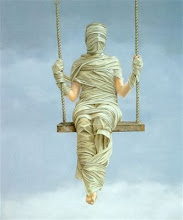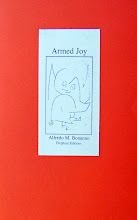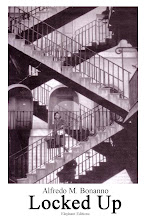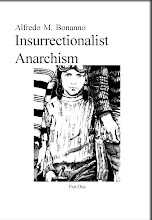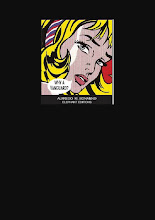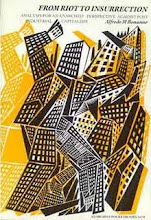First published in English in Insurrection issue 2 1984
Exploitation is the foundation of the capitalist system. Without a terroristic dictatorship based on poverty, fear and death by a few over the many, capital's dominion would come to an end.
This determines the class struggle. Although they seem to adapt and compromise, the exploited are constantly on the defensive and ready. They follow the enemy's difficulties with interest, regard their traitors (who call themselves their defenders) with suspicion, and wait for the best moment to rise up and insurge.
The social clash alternates between acute confrontation and quieter spells. New theories and practices are developed that are never a simple repetition of what has gone before. Each historic moment produces new opposing sides: new bosses, new traitors, new exploited, new strategies of attack against exploitation, new attempts at repression.
Roughly speaking, we can say capital is moving from repression through use of the economic apparatus to that using the political one. In the past, in happier times for capital, wide strata of the population were prepared to offer themselves in exchange for a wage, so everything was left to illusions of self-regulating market forces. As these strata diminished, with a consequent rise in the cost of labour, or when social pressure forced employment to grow out of all proportion, the system's automatic margins of equilibrium are reduced and it goes towards more overtly political and repressive strategies. The State intervenes massively to regulate both the economic and social process. Troubles become acute, the police becoming the cardinal element in maintaining social order, with the army waiting in the wings.
The exploited's strateqy also passes from a trade union type of organising - corresponding to the free market phase of capital - to a more disjointed procedure, apparently uncertain and contradictory, but which is lively and creative and more amenable to self-organisation. This process heightens the level of the struggle, possibly even allowing the use of armed struggle.
It should not seem contradictory that the exploited respond to the State's attempts at enforced order with creativity and self-organisation. Increasing repression triggers off many mechanisms, one of them precisely that of heightening the level of the social clash. Moreover, this comes as a result of deteriorating conditions where large wageless strata are no longer waiting patiently to enter the world of production, even at starvation wages. Hopes of better times, more consumer goods and better wages are far more effec-tive reins than police or army.
REPRESSIVE STRATEGIES AND METHODS
Strategies are the choice of certain methods that are applied in the social clash. Methods are stable and well-defined procedures, so much so that they cannot be changed, at least within the present framework of exploitation.
Whereas strategies are linked to short term conditions and must constantly be up-dated, modified, discussed and, when necessary, declared unsuitable, methods are fixed, guaranteeing a continuity that characterises the struggle on both fronts. Strategies are constantly changing in the clash between classes, but the methods used remain the same.
As we have seen, capital uses different strategies at different moments: it goes from a free market logic to nationalised production, mixes increased productivity with less military repression and vice versa. Sometimes it intensifies consumerism, at others it reduces it, using monetary mechanisms instead of taxation. At still other times it uses overt repression, establishing a closed regime using nationalistic puppet politicians and uniformed torturers to eliminate all dissent in bloodshed.
But all these strategies are based on four basic methods:
Information controlled by the power structure. This is not only the work of the media, but also of everything that appears to be based on consultation with the people: elections, choice of work, choice of culture, use of free time, consumerism, political opinions, scale of ethical values, etc.
Differentiated education of the various social classes. Not just a question of schooling, this is a continuing process. It is the method that corroborates and instills controlled information that would otherwise disappear into a void. A series of coordinated processes that produce and confirm ethical values, they are often applied at mass level, but are sometimes restricted to a minority.
Political and social reform. Any one of power's single projects must be seen as part of a constantly changing whole. Even the most tyrannical regimes of the past moved towards adjusting and compromising with the oppressed. Absolute repression is a myth, an ideal that no reigning power can maintain for long. A mixture of pure repression and reformist compromise is always preferred. Modern democracies have gone a long way in this direction.
Terroristic repression of any behaviour deviating from the established norm. This goes from social condemnation to organised terror by police, army, courts, prisons, etc., against anyone who tries to reappropriate what has been taken from him. In the latter case the State will use either specific organisations (police, secret services, army, etc); organisations designated for other activities, but which carry out terrorist duties when required (trades unions, parties, political movements, schools, hospitals, cultural structures, newspapers, television, etc.) or specifically terrorist organisations created by the State itself, drawing from the army, police, judiciary, extreme right political movements, professional killers, organised crime syndicates, etc.
It should be said here that any one of these methods does not exclude another, but that they are all applied at the same time with interesting results. Think, for example, of the effect that the development of information is having on the educational process. 'Informatics' are still very much in the air. Basically, as we have said, repression is intensified when the other two methods show signs of slowing up and becoming inefficient. The inverse process, a reduction in State terrorism, tends to be slow as the organisations and mentalities whose usual methods are those of violence, torture and murder, tend to die hard.
REVOLUTIONARY STRATEGIES AND METHODS
The difference between strategies and methods is constant, as it is a question of the forms of action man possesses. Whether policeman or revolutionary, he cannot avoid studying the strategically different application of some basic methods.
Strategies are directly related to the conditions of the social clash at a given moment, not simply a consequence of it. The revolutionary is constantly trying to act on reality, to penetrate it and change it with his actions. But these actions, if they are to go beyond the field of illusion, must take account of the level the clash is at.
When the level of the clash is low, with wide strata of the exploited excluded from wage-earning and capital abandons itself to irrational market forces, the revolutionary strategy will be that of strengthening the movement, penetrating the various sectors of the world of work and unemployment among workers, housewives, labourers and students.
At a higher level, capital begins to show signs of instability. The State intervenes heavily to rectify an intolerable situation created by the capitalists' inability to manage the economy. The State's terroristic repression increases, dually, each struggle risks becoming reabsorbed and often contributes to strengthening exploitation by rectifying some of its irrational aspects. Although it is partial and circumscribed, information and theory can be understood by the exploited during these moments. Things would remain at a purely theoretical and meaningless level otherwise. It is in the struggle itself, even the limited one in defence of rights or already existing conquests, that we prepare for a possible heightening of the clash.
Armed struggle employs the method of violent attack against the State, its organisations and structures, its men, wealth and projects. The fact that this method is often part of strategies at higher levels of the social clash does not mean that it is a 'higher', or more efficient, or more revolutionary method of struggle than others. It is a different method, with its own characteristics, limitations and qualities, but which can-not be placed in a hypothetical scale of revolutionary values. One level of consciousness pushes a proletarian to hand out a leaflet in front of a factory, another to arm himself to take back what has been taken from him, or to shoot a policeman or judge. Another again pushes him to attack a factory, sabotage its production and damage stocks. Still another will make him associate with others in the same situation, men and women conscious of the need to come together to work out an attack against the class enemy.
No one of these methods excludes the other. On the contrary, they interpenetrate and support each other. It is therefore never possible to positively identify one precise moment where a given method should be used. They are used together and bear fruit according to the limits and perspectives of the various strategies they are applied in.
THE PROBLEM OF STRATEGY
A strategy of attack is of little importance for the dreamers of revolution. There exists an illusion that truth will triumph in the end, so, like the Christian martyrs one marches onwards, holding high the torch of ideological purity, but often remaining very far from the reality of things.
In actual fact, the proletarians and exploited in general, the lumpen proletarian strata who undergo very acute levels of oppression, do not have clear ideas. The equation exploitation/clarity is not at all true. One can live one's whole life in chains, dragging them along, and still believe one has lived thanks to them rather than in spite of them. This point cannot be overstressed. Information on its own is not enough. Struggles must be developed, both in the intermediate and long term. Clear strategies are necessary to allow different methods to be used,in a coordinated and fruitful way.
As anarchists we are pursuing a qualitative growth in the movement, and support its self-organisation. We distinguish ourselves in this from the authoritarians and stalinists who support a massively quantitative growth based on total control and 'democratic' centralism. But not for this can we wait to infinity for the people to organise with their quality and creativity. We must act more directly, moving as a specific minority. This means taking on the task of carrying out actions that the exploited, at a certain level of the class struggle, cannot develop on their own. If we fail to do this we will simply end up consigning ourselves into the hands of the stalinists, and the proletariat along with us.
Let us give a few examples:
When setting out information we must adhere to reality as clearly as possible in order to avoid any ideological re-elaboration. We cannot expect the exploited to act immediately on reading our information, putting it to their own spontaneous use. We would be heading straight for failure, and end up circulating a horrible mixture of platitudes and meaningless generalisations. We should apply a revolutionary critique to contributions to our publications, so as to place them within our strategy more coherently. Our work will never be purely 'objective' without denying itself as information.
We must force ourselves to see things as they are, not how we would like them to be. Our innate love for utopia - of great nobility and sentimentality - must take second place in the face of the need for analysis based on reality. To do this, or even to simply understand it when it is done by other comrades, we must provide ourselves with some basic instruments. We might as well limit ourselves to pub talk if we don't possess some basic awareness (and perhaps a bit more than that) of economics. The point-blank refusal to widen our study of certain instruments such as economics, history, philosophy, State administration, public finance, etc., is based on a mistaken interpretation of the anarchist concept of destruction.
Anarchists are often reluctant to involve themselves in intermediate struggles. Their essential purity causes them to have nightmares. They imagine being compromised with other not always 'clean' political forces, and of not being able to compete with them at the level of intermediate claims or political sophistry. This blocks many initiatives at the simple stage of information. In so doing we are showing lack of faith in the great clarity of the anarchist discourse which demonstrates the need to refuse delegation of the struggle. Then they are surprised and almost disdainful about the fact that the exploited do not have clear ideas, fail to understand why they should not delegate their struggle to others, and continue to be conned by the professional politicians. This tragicomic situation often becomes clear in public debates, conferences and demonstrations that have been organised together with the forces of the more or less revolutionary left. The anarchists start off with great gusto, go all out to organise demonstrations, work out their own information with great precision and clarity (through leaflets, posters, talks, conferences, etc), then reach a mental block. They abandon the political management of the event to other forces. It is usually these forces that exploit the anarchists' great propagandistic energy and manipulate the media, implying they are the only ones capable of doing anything against power.
The anarchists, in the meantime, have returned to their own groups and are asking themselves how on earth, yet again, they have failed to prevent a political take-over of their initiatives. At the same time they remain prepared and available for any future requests of collaboration.
We cannot stop half way in these things. Once begun, we must continue to prevent attempts at being taken over, even using political means. After all, we too can intervene before the stalinists take over. And we too, especially when we are among the organisers of the demonstration, can get particular motions passed at the end of the conference or meeting without feeling more 'dirty' or compromised than when we set out to work with other left political groups. To brush these problems aside, considering them unimportant or pointless compromise, we risk losing the fruits of the intermediate work and of appearing to the proletariat as comrades who are there purely by accident, alongside other political factions that are far more organised than ourselves. This gives the exploited the idea that party leadership is indispensable, the stalinists are given a hand in their grim quantitative work, and what we had tried to build at the start is lost.
There is no need to be afraid of dirtying our hands by using methods of intermediate struggles, so long as the aims of anarchists remain clear throughout, showing up the tricks of the professional politicians and the risks of authoritarianism. This can be achieved to a certain extent by not backing out of arguments with the authoritarian political sharks.
IN CLANDESTINE ARMED STRUGGLE things cannot be left to improvisation or to the spontaneity of individuals or very small groups. This method is extremely articulate and lends itself to applications of great strategic importance along with the intervention of other methods. From sabotage and the actions of individuals or very small autonomous groups, quite wide levels can be reached, capable of drawing in dozens of groups and hundreds of comrades. It is important to note here that the qualititative development of armed revolutionary action comes into contrast with some of its indispensable quantitative needs. A few comrades cannot do much, but it is a mistake to think that a simple growth in numbers gives rise to a correct use of armed struggle as a method. Generally, what is being looked for at the organisational stage is the creative development of ideas, theories, analysis, interpersonal relations, actions, contacts with the outside, and a spreading of the strategic project. An increase in numbers follows afterwards, and in turn will have a considerable effect on the quality of the organisation. One should not go too far in either direction: neither thinking purely in terms of number, nor going to the other extreme, believing that quality is the only thing that counts. This apparent contradiction only exists when the method is seen as something immediate and circumscribed, instead of being seen in the long term.
Certain aspects of armed struggle can also be used in the intermediate stage, that of information. At this point it will not be likely to spread, but to accentuate the information itself. The 'angle' one gives to this is important. Not being 'mealy-mouthed', saying things clearly, and backing them up with 'harder' forms of intervention, can stimulate an awakening of consciousness and is a creative contribution to a quantitative growth in the future.
Alfredo M. Bonanno
skip to main |
skip to sidebar

Some writings of Alfredo Maria Bonanno in English, or almost

Alfredo Bonanno was arrested on October 1st 2009 in Greece, accused of concourse in robbery. With him, anarchist comrade Christos Stratigopoulos.
Here are a few translations and part translations of a small portion of Alfredo's writing. This is a work in progress, many of the translations are as yet incomplete. Open links to find more of Alfredo's work.
Alfredo Bonnano Released
Nov. 22 Alfredo Bonnano was sentenced to 4 years imprisonment (which practically means that with the time served so far and the fact that he is over 70years old HE IS RELEASED
Christos Stratigopoulos (who took responsibility for the action)
was sentenced to 8 years and 9 months with the Greek law will probably be released at the end 2011
BY ANY MEANS NECESSARY
LINKS
click on any of these labels to read text
- "Community" sickness
- 1981 - Editorial
- A Critique of Syndicalist Methods
- A few notes on Sacco and Vanzetti
- A few notes on the revolutionary movement in Italy
- A little man in Singapore
- A million jobs
- A question of class
- Affinity
- After Marx autonomy
- Albania Laboratory of Subversion (Introduction)
- Anarchism and the national liberation struggle
- Anarchists and action
- AND WE WILL ALWAYS BE READY TO STORM THE HEAVENS AGAIN (Against amnesty)
- ANTI-INSTITUTIONAL MOVEMENT
- Are we modern?
- Armed Joy
- ARMED STRUGGLE. SOME REFLECTIONS.
- Autonomous base nuclei
- beyond syndicalism
- Beyond workerism
- But what is the imaginary?
- Class War
- Comiso - Organizational document of the self-managed leagues
- Considerations on illegality
- Dissonances (Introduction)
- Elephant Editions 1986
- Excluded and included
- Farewell to claiming
- Feral Revolution (Introduction)
- FICTITIOUS MOVEMENT AND REAL MOVEMENT
- For an Antiauthoritarian Insurrectionist International - Proposal for a debate
- From riot to insurrection
- From the centre to the periphery
- Good technology
- Guerilla Extraordinary
- Habits and idols
- Hegel
- I know who killed chief superintendent Luigi Calabresi
- Illegality
- Illness and capital
- Informal organisation
- Insurrection
- Internationalism
- Introduction to Sabate
- Introduction to Anarchism and Violence
- Introduction to Bratach Dubh English edition of Malatesta's Fra Contadini
- Introduction to Insurrectionalist Anarchism
- Introduction to Strange Victories
- Introduction to The Conquest of Bread
- Involuntary aspects of voluntary work
- Let's destroy work
- LET'S DESTROY WORK. New introduction
- Let's keep our feet on the ground please
- Lightening Conductors and Stand-ins - more shots of non-news
- Lightning Conductors and Stand-ins
- Lightning Conductors and Stand-ins (cont.)
- Locked up
- Looking forward to self-management
- Loss of language
- More on internationalism
- National Liberation Struggle
- nineteen years on
- No more crises
- Non-news about drugs
- Non-news about racism
- Ode to the Uniform
- On Feminism
- One's life on the line
- Order and chaos
- Otto Ruhle (Introductory Note)
- OUR ROLE IN THE PRESENT CONFLICT
- Palestine mon amour
- Pantagruel anarchist review
- Pinelli
- Prison and Prisoners’ Struggles - Introduction
- Propulsive Utopia
- Quality and the factory
- Restructuring Capital and the new democracy
- Revolution - Violence - Antiauthoritarianism
- REVOLUTIONARY VIOLENCE
- Science and the social revolution
- Self-management
- Severino Di Giovanni in Argentina 1923-1931 by Osvaldo Bayer
- Social banditry
- SOME NOTES -
- Space and Capital
- Stirner
- Stop the City? From information to attack
- Strategy and Methods
- Streamlined production
- The "end" of the crisis
- The aesthetics of anarchism
- The anarchist tension
- The area of autonomy and the anarchist movement in Italy
- The armed wing of science
- The Cruise missile base at Comiso can be prevented
- The ethical bank
- The insurrectional project
- THE LANGUAGE OF TECNICS -
- The logic of insurrection
- The moral split
- THE NECESSARY DESTRUCTION -
- The priority of practice
- The refusal of arms
- The revolutionary project
- The revolutionary struggle
- The significance of an insignificant event
- The struggle for self-managed social space
- The tyranny of weakness
- The whole and the part
- The young in a post industrial society
- Theory and action
- Towards anarchist antimilitarism
- TOWARDS THE GENERALISATION OF ARMED STRUGGLE
- TRANSFORMATION IN THE WORLD OF WORK AND SCHOOL -
- TRUTH -
- Unemployment in Italy - How come everything doesn't explode?
- Untitled
- Violence and non-violence
- What are anarchists
- What can we do with anti-fascism?
- Why a vanguard?
- Why Insurrection
- World domination in a few words

